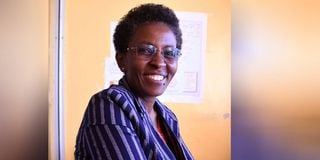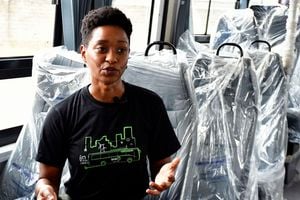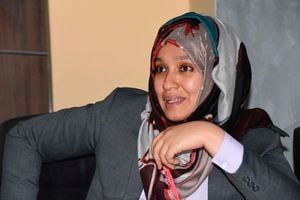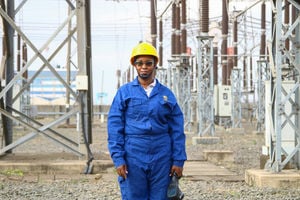
Eng. Jane Mutulili.
A first glance at Engineer Jane Mutulili does not give away anything about her. Rocking her signature natural hair cornrows with a touch of grey on the edges, she easily passes for your typical next door neighbour — the motherly one.
But a one-and-a half-hour chat with her reveals her humorous side as well as the high-flyer she is. In March this year, Eng. Mutulili became the first female chairperson of the Association of Consulting Engineers of Kenya (ACEK) since its inception in 1968.
“My vision for ACEK is not visibility just for the sake of visibility. I want Kenyans to know and understand that we have qualified engineers in the country who have done and are capable of doing big projects. We have had incidents of foreigners being contracted to run some crucial projects, which gives the notion that Kenya lacks quality engineers. We want to change that perspective because, if anything, Kenya has some of the best engineers in Africa. The other goal is to build capacity for the young professionals in the industry. We want to leave a legacy.”
Born and brought up in Nyeri County, Eng. Mutulili is the third of nine siblings, all girls. “I grew up in a large family. We performed household chores communally so that we could share the one available radio. Since there were certain programmes that we all wanted to listen to, we would perform the same chores together, including going to the shamba, cleaning and cooking.
Unbreakable bond
That helped us establish an unbreakable bond. There was never tension in our home, we joked and made fun of everything and everybody. We had such an easy time with each other,” says the mother of three. She also has three step brothers.
Eng. Mutulili began her degree in civil engineering at the University of Nairobi in 1990 after finishing her high school education at Githumu High School in Murang’a County and performing well in mathematics and physics. “In a class of 130 comrades, we were eight women, which was the highest number of girls in one intake ever,” she says.
At the age of 22, in her second year, she got pregnant with her first child.
“I gave birth one week before the end-of-semester exams, but I never deferred my studies,” she says.
By the time she was finishing her undergraduate degree, she was expecting her second child and after her graduation, her career kicked off at City Hall’s water department. “Interestingly, these two children, whose age gap is only 15 months, are both trained engineers.”
“The first 10 years of my stay at City Hall shaped my career. I got to learn so much in the field, from water supplies to designs and construction. During my time there, among other things, I was involved in the Third Nairobi Supply Water Project, which saw the augmentation of water from Ndakaini Dam, expansion of the Ng’ethu Treatment Works, Construction of four major storage tanks, Gigiri, Kiambu, Karura and Wilson Airport Reservoirs and water supply pipelines in the city and construction of various offices.
It was while at City Hall that she registered as a professional water engineer with the Engineers Registration Board, now Engineers Board of Kenya (EBK), and later with the Institution of Engineers of Kenya (IEK).
Founded company
“After a 10-year stint at City Hall, I resigned to start my own company. At first, I collaborated with a fellow engineer but after a while, we decided to part ways. I later founded my company, La Femme Engineering Services based on an interesting gap I observed in the industry. Those days, not many engineers were into construction, so construction was pretty much left to businessmen. I felt we could change this.
“I decided to start a company that would offer design and construction services,” she says with a hearty laugh.
While successfully running La Famme Engineering Services, Eng Mutulili has worked for several organisations including Kenya Pipeline and Kenyatta University. She also worked in Daadab and Kakuma refugee camps. She notes that this was the most fulfilling part of her career.
“Seeing my work directly impact the lives of this vulnerable group was very fulfilling,” she says.
She has had a leadership streak since high school where she was the head girl at Githumu High School and also the in-charge of Company J at the National Youth Service (NYS), which was a mandatory pre-university course.
She has served as a Board member of the National Construction Authority and was appointed as a board member of Bishop Gatimu Ngandu Girl’s School by the Cabinet Secretary for Education in 2019.
She served in the Institution of Engineers of Kenya (IEK) as Council Member from 2012 to 2018 and later as the first Vice President 2018 to 2020 before joining ACEK, first as a Council member, Secretary, and now as the Chairperson.
Competing male engineers
One of the main challenges she faces as a female engineer is the notion that she is competing with male engineers. “Being a woman does not make me any less of an engineer. It is not a qualification so when I take up assignments or responsibilities, I act as the competent engineer that I am.
A fun fact about Jane is that she is an ardent farmer. She takes every free moment to visit her farm in Nyeri where she has planted peas, onions, and garlic. She finds it very therapeutic and relaxing. The jolly grandmother of two says that her cushion and grounder as a woman is the Catholic Women Association of St Paul’s University Chapel. “After my sisters, these women are my biggest social support system.”
Her favourite meal is minji-carrot stew with rice. Admittedly, the engineer fears snakes, and she can consume anything except honey.
She aspires to become a trainer of engineering. “I want to be a FIDIC Certified Contracts Trainer when I retire. To accomplish this, I intend to start the three-year intensive training.”








